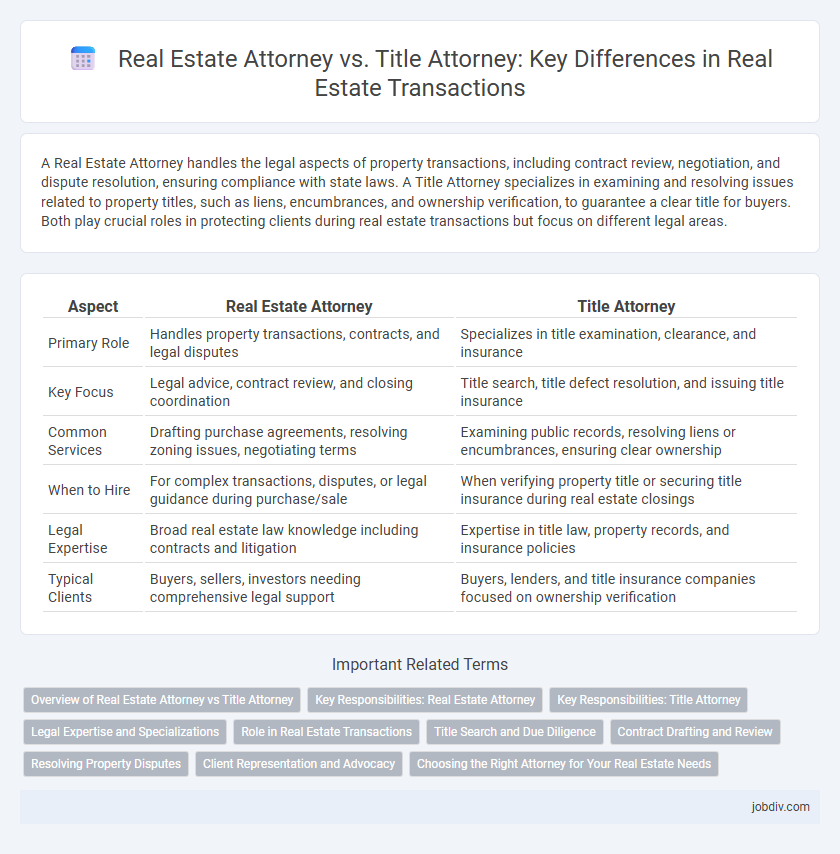A Real Estate Attorney handles the legal aspects of property transactions, including contract review, negotiation, and dispute resolution, ensuring compliance with state laws. A Title Attorney specializes in examining and resolving issues related to property titles, such as liens, encumbrances, and ownership verification, to guarantee a clear title for buyers. Both play crucial roles in protecting clients during real estate transactions but focus on different legal areas.
Table of Comparison
| Aspect | Real Estate Attorney | Title Attorney |
|---|---|---|
| Primary Role | Handles property transactions, contracts, and legal disputes | Specializes in title examination, clearance, and insurance |
| Key Focus | Legal advice, contract review, and closing coordination | Title search, title defect resolution, and issuing title insurance |
| Common Services | Drafting purchase agreements, resolving zoning issues, negotiating terms | Examining public records, resolving liens or encumbrances, ensuring clear ownership |
| When to Hire | For complex transactions, disputes, or legal guidance during purchase/sale | When verifying property title or securing title insurance during real estate closings |
| Legal Expertise | Broad real estate law knowledge including contracts and litigation | Expertise in title law, property records, and insurance policies |
| Typical Clients | Buyers, sellers, investors needing comprehensive legal support | Buyers, lenders, and title insurance companies focused on ownership verification |
Overview of Real Estate Attorney vs Title Attorney
Real estate attorneys specialize in handling a wide range of property-related legal matters, including contract review, dispute resolution, and transaction support. Title attorneys focus specifically on title examination, addressing ownership issues, resolving title defects, and ensuring clear property titles for smooth transfers. Understanding the distinct roles of real estate attorneys and title attorneys is essential for protecting property rights and facilitating secure real estate transactions.
Key Responsibilities: Real Estate Attorney
Real estate attorneys manage legal aspects of property transactions, including drafting and reviewing purchase agreements, negotiating contract terms, and ensuring compliance with local real estate laws. They provide counsel on zoning issues, handle disputes related to property boundaries, and represent clients in foreclosure or landlord-tenant cases. Skilled in contract law and property rights, real estate attorneys protect clients' interests throughout the buying, selling, or refinancing process.
Key Responsibilities: Title Attorney
Title attorneys specialize in examining and verifying property titles to ensure clear ownership and resolve any potential liens or encumbrances. They conduct thorough title searches and prepare title insurance policies to protect buyers and lenders from future disputes. Their key responsibility includes addressing defects in titles and facilitating smooth property transactions by confirming legal ownership.
Legal Expertise and Specializations
Real estate attorneys specialize in a broad range of property-related legal matters including contract drafting, negotiations, disputes, and closing processes. Title attorneys focus specifically on examining and resolving title issues, ensuring clear property ownership and handling title insurance claims. Their legal expertise is essential for mitigating risks associated with property transactions and safeguarding client interests.
Role in Real Estate Transactions
A Real Estate Attorney handles a wide range of legal matters including contract review, negotiation, and dispute resolution throughout property transactions. A Title Attorney specializes in verifying and clearing property titles, ensuring there are no liens or ownership issues that could affect the sale. Both play crucial roles in protecting client interests and ensuring smooth, legally compliant real estate closings.
Title Search and Due Diligence
A Real Estate Attorney handles a broad range of property transactions, contract reviews, and legal disputes, while a Title Attorney specializes in conducting thorough title searches to verify property ownership and identify liens or encumbrances. The title search process involves an extensive review of public records, including deeds, mortgages, and tax liens, to ensure clear title transfer. Due diligence performed by a Title Attorney safeguards buyers and lenders by uncovering potential risks that could affect property rights or marketability.
Contract Drafting and Review
Real estate attorneys specialize in contract drafting and review to ensure comprehensive protection of their clients' interests during property transactions, addressing complex legal issues such as contingencies, disclosures, and financing terms. Title attorneys focus primarily on examining and resolving property title issues, including title searches, clearing liens, and ensuring marketable title, but typically do not draft or revise purchase agreements. For thorough contract drafting and review, hiring a real estate attorney is essential to mitigate risks and enforce contractual obligations effectively.
Resolving Property Disputes
A Real Estate Attorney specializes in resolving property disputes by handling contract issues, ownership conflicts, and zoning challenges, ensuring clear legal property rights. Title Attorneys focus on examining property titles, resolving title defects, and facilitating title insurance to guarantee undisputed property ownership. Both professionals play crucial roles in reducing litigation risks and securing smooth real estate transactions.
Client Representation and Advocacy
Real estate attorneys provide comprehensive client representation by handling contract negotiations, disputes, and legal advice throughout property transactions to protect clients' interests. Title attorneys focus specifically on verifying and securing title ownership, resolving title defects, and ensuring clear property titles for clients. Both roles are essential for advocacy, with real estate attorneys offering broader legal support and title attorneys specializing in the accuracy and legality of property ownership records.
Choosing the Right Attorney for Your Real Estate Needs
Selecting the right attorney for real estate transactions hinges on understanding the distinct roles of a real estate attorney and a title attorney. A real estate attorney manages contract reviews, negotiations, and legal advice throughout the buying or selling process, while a title attorney specializes in examining and resolving title issues to ensure clear property ownership. Evaluating your specific needs, such as contract complexity or title concerns, helps determine whether a real estate attorney, title attorney, or both are essential for a smooth transaction.
Real Estate Attorney vs Title Attorney Infographic

 jobdiv.com
jobdiv.com